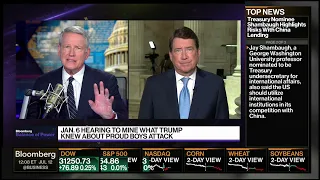WASHINGTON—United States Senator Bill Hagerty (R-TN), a member of the Senate Foreign Relations Committee and former U.S. Ambassador to Japan, today joined Balance of Power on Bloomberg TV to discuss the life and legacy of former Japanese Prime Minister Shinzo Abe, as well as Hagerty’s Senate-passed semiconductor legislation, and the need to unleash American energy.

Partial Transcript
Hagerty on former Prime Minister Abe’s legacy: “Shinzo Abe was a man that I deeply respected and someone whose friendship I enjoyed. My condolences, my family’s condolences go to his wife, Akie, to his mother, Mrs. Kishi. It’s a tragedy of epic proportions when you think about it, because we’ve lost not only a friend, but a great leader in the region. It was his vision that started the entire Indo-Pacific strategy that we’ve seen both Republican and Democratic administrations follow. The Quad was born from his vision and he has done a great deal in terms of building and strengthening the Alliance between the United States and Japan. I found him to be a terrific partner and without his help, we would’ve never been able to execute our strategy versus North Korea in terms of putting a maximum pressure campaign in place that did a great deal to bring down the temperature eventually and put North Korea into a better place. You think about the loss that we’ve incurred here, it’s beyond just affecting Japan; it’s going to affect the entire region.”
Hagerty on the global impact of former Prime Minister Abe’s death: “Japan is the third largest economy in the world after the United States and China. Importantly too, Japan is our strongest military partner. We have more U.S. military troops stationed in Japan than any place else in the world, so they play a consequential role in terms of the geography there, our strategic posture, and the economy. I think that Shinzo Abe’s passing, I hope will not embolden China to become even more aggressive, but you knew with Shinzo Abe and his vision and his leadership that he was going to stand strong against the aggressive posture that Communist China has taken in the region. It was again, his vision that talked about the free and open Indo-Pacific. But I think that the current Prime Minister of Japan, Prime Minister Kishida, is going to continue to press that vision forward. The people of Japan support the vision that Prime Minister Abe laid out. And certainly it’s consistent with the United States’ national security interests.”
Hagerty on strengthening the U.S.-Japan Alliance: “We’ve seen consecutive leaders from Prime Minister Suga to Prime Minister Kishida who have continued to follow that vision. And in fact, Japan has stepped up its desire to essentially double its military expenditures. I was just there in April and, in fact, met with Prime Minister Abe, former Prime Minister Abe at that point, along with Senator [Ben] Cardin and Senator [John] Cornyn. We encouraged them not to make it just a spending exercise, but to use those additional funds to work on interoperability with the United States, to make the best of the technology that’s available between our nations, and to do more joint training so that we have the most effective and the most capable force possible to be present in that area so that we can make certain that the whole region remains free and open and push back against the aggression of Communist China.”
Hagerty on his Senate-passed semiconductor legislation: “What I’ve been in favor of is something far simpler and something that costs the American public far less [than USICA], and that’s the legislation that I put forward that has passed the Senate. It’s in the House right now. What it does is it dramatically compresses the timeline to permit a semiconductor manufacturing facility here in America. Today, it takes about five years to permit a fabrication facility here. That’s why we don’t have chip plants in America. With my legislation, it takes that timeline down to about 18 months. Does it cost the taxpayers anything? No. Does it require any subsidies? No. Does it have a bunch of Green New Deal things attached to it? Absolutely not. And my hope is that this will pass the House, President Biden will sign it, and this will make America competitive again. It’ll put us in a position to attract the capital that we need to see semiconductor investment happen on a broad-scale basis right here in America.”
Hagerty on how to ease inflation and lower energy costs: “The one thing we could do is get back into the energy business, Dave. If you look at what’s driving this inflation, there are a number of factors, but the biggest factor of all is the fact that the current Administration has decided to wage war on the fossil fuel industry right here in America. We went from a position of energy independence where the United States was actually a net exporter of energy, just 18 months ago, to a position now where we are in deep trouble. We’ve seen prices rise across the board. We’re at record highs in terms of gas prices at the pump. Diesel is a real issue here and that’s permeating every aspect of the economy. Goods have to be transported. This is so inflationary, and the answer is right before us: get back into the energy business.”
###